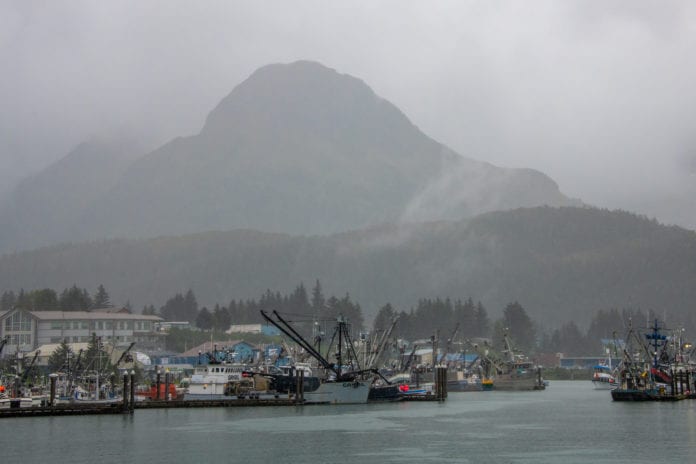When the North Pacific Fishery Management Council adopted its halibut Catch Share Plan back 2014, charter operators were granted 125% of their historic catch at low levels of abundance, with that additional 25% coming out of quota for the commercial longline sector.
Commercial longliners were assured that no further uncompensated reallocations would be considered, but now federal fisheries managers are doing just that.
The NPFMC is expected to engage in an initial review of the matter in December in Anchorage, after considering an analysis of two options included under one alternative approved by the council during its virtual February meeting. The only other alternative would be status quo of the CSP.
The issue is a contentious one, as while there has been a decline in the halibut resource, there are a growing number of individuals willing to spend several thousand dollars, travel not included, for four days of fishing out of a luxurious fishing lodge in Southeast or Southcentral Alaska.
Online advertising for these lodges features happy customers hauling in a robust harvest of wild Alaska seafood, Pacific halibut included, from the pristine waters of Alaska, under warm, sunny skies.
For a single price these lodges, with a staff of veteran fishing guides, as well as charter operators who provide fishing instruction, help land the catch, and often fillet, box and ship the fish.
Charter operators in favor of reviewing the CSP cite a variety of reasons. They range from each halibut kept by a charter client may be worth more than $1,000 to the community where they fish out of to having to turn away clients because they don’t know when they will be allowed to fish. They also told the council in written testimony that commercial groundfish harvesters’ bycatch of halibut was contributing to the demise of the halibut resource.
Weekday closures when charters are not allowed to fish “have emptied harbor parking lots, left local businesses high and dry, and these regulations have no real conservation benefit overall,” said Kevin Burchfield, of Juneau Charter Boat Operations Association.
“One of our primary local breakfast/coffee shops doesn’t even open on the mornings we are closed,” said Raymond Nix, of Crazy Rays Adventures, on Whittier.
Clients may be hesitant to book when lodge owners don’t know what the coming year’s halibut limits will be, said Luther Andersen, of King of Kings Guide Service and Lodge on the Kenai Peninsula.
On the other side are commercial harvesters like Karl Koetzinger, who fishes commercially for halibut out of Cordova. Koetzinger told the council that there are already programs in place for the charter industry to lease and eventually purchase more quota.
“The original catch sharing plan established a program for the charter industry to lease quota through the Guided Angler Fish program, and eventually to purchase more quota through the Recreational Quota Entity program,” he said.
Marc Carrel, groundfish division co-chair for Cordova District Fishermen United, told the council that the existing Catch Sharing Plan has met its objectives and that CDFU opposes modifications to it.
“After years of uncompensated reallocation in favor of the charter industry the CSP brought a measure of stability to the commercial fishing fleet, and renewed our trust in the process,” he said. “For the charter industry the CSP brought a longer season with no interruptions by management changes.”
That plan has also brought the commercial and charter fishing fleets together as partners in conservation and management of Pacific halibut, he said.
“We have enjoyed working together with charter fishing groups at the IPHC and NPFMC and would like this alliance to continue to remain strong,” Carrel said. “Attempting to modify the allocation plan will create a battle that benefits no one.”
Carrel also said that at the current low levels of abundance, the CSP already provides an increased allocation to the charter industry, thus shifting the burden of conservation further on to commercial fishermen.
“We are committed to working with the charter industry to help rebuild the stock and to reduce halibut bycatch in the non-directed fisheries,” Carrel said. “However, we are steadfastly opposed to any additional uncompensated reallocation of the combined catch limit in favor of the charter industry.”
The Halibut Coalition is urging its membership of commercial harvesters to write to the governors of Alaska, Washington and Oregon expressing their views, as the representatives of those states on the NPFMC voted in favor of considering changes to halibut allocations.
“The council committed in 2012 to the CSP, ending 20 years of uncompensated reallocation of commercial quota to the charter sector, and included a one-way, market-based mechanism to allow charter operators in increase harvesting opportunities for clients via leasing quota,” said Linda Behnken, executive director of the Alaska Longline Fishermen’s Association.
“Evidently paying for quota is an obstacle for charter operators; they prefer to take it, and the council just legitimized that approach by scheduling this analysis,” Behnken said.
The CSP has brought a measure of stability to the halibut fishery, established sector accountability, and tied both charter and commercial catch limits to resource abundance, she said.
“Halibut is exclusively a domestic market enjoyed nationally,” she added. “It is not good for our fishermen or markets to take more fish away from the commercial sector, compensated or uncompensated. It is valued by Americans and American markets.”
Bob Alverson, manager of the Fishing Vessel Owners Association and a U.S. Commissioner on the International Pacific Halibut Commission, noted that the council has struggled with halibut allocation issues between commercial and charter interests for 25 years.
The matter seemed to have been resolved when the council supported the idea that charter interests could purchase commercial quota to augment charter seasons and catch, he said.
“The NPFMC chose to allow the marketplace to be the arbiter of future allocations,” he said. “This reconsideration of allocation puts Alaska, Washington and Oregon commercial and charter interests in unnecessarily adversarial positions which is something previous council members intended to avoid.”















